Stockton Faculty Members Continue Learning at NYU
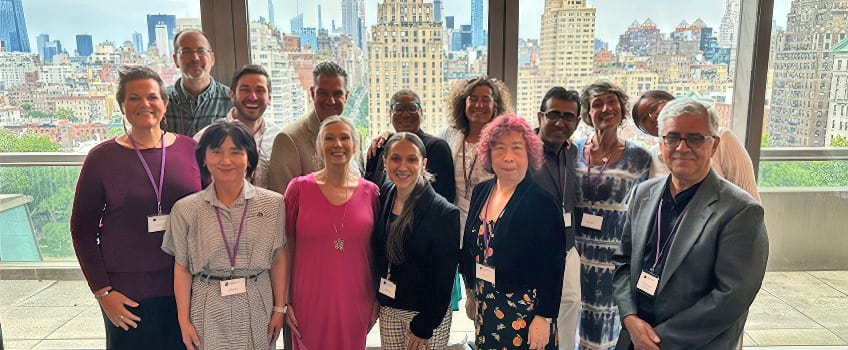
Fifteen Stockton faculty members participated in the June 11-14 Summer Seminar, a mass professional development event offered through the Faculty Resource Network program at New York University.
Galloway, N.J. – Fifteen Stockton University faculty members immersed themselves in various professional development opportunities offered through the Faculty Resource Network (FRN) program at New York University (NYU) in June.
The faculty who attended the June 11-14 Summer Seminar represented every academic school at Stockton. While the sessions and workshops varied in topic, all of them had a common thread: Exploring new and innovative ways to create a learning environment for both faculty and the students that they teach. Below is a recounting of some of their experiences.
Addressing Student Engagement
Trina Gipson-Jones, Assistant Professor of Health Science & Christine Gayda-Chelder, Associate Professor of Psychology
This year was Gipson-Jones’ and Gayda’s first summer seminar. They both decided that the summer was an excellent opportunity for them to continue learning from colleagues and seminar instructors and make great connections.
From their session, they were able to explore how their colleagues have been stimulating engagement on campus through different strategies, such as fostering a community in the classroom and identifying barriers to learning at the start of the semester.
“I attended the ‘Evidence-Based Strategies to Increase Student Engagement’ seminar because I wanted to expand the ways I engage the students in my classes and learn more about building an inclusive classroom,” Gipson-Jones said. “I am working some of the seminar's key aspects into my course design (e.g., Blackboard content, syllabi and course presentations).”
🔑 KEY TAKEAWAY: Allowing student choice and voice regarding assignments and class activities are great engagement strategies.
“I will be incorporating new and innovative group and individual assignments to generate engagement,” Gayda said. “More choices will be offered to align with various student learning styles. For example, create a video segment or write a paper.”
According to Gipson-Jones and Gayda, opportunities for professional development, like the FRN’s summer and winter seminars, provide valuable avenues for faculty to collaborate and learn from each other.
“Attending the FRN seminars allows you to explore different topics relevant to your teaching, engage with colleagues from many different universities and colleges and discover new ways to engage your students,” Gipson-Jones said.
“This was an enlightening and invigorating experience,” Gayda said. “Meeting colleagues who share my passion for teaching from around the globe was so uplifting and inspiring. To continually excel as faculty, we must engage with others in higher education and share new and innovative strategies that engage our students.”
Exploring Artificial Intelligence
Connie Tang, Professor of Psychology, Tara Crowell, Professor of Public Health & Mary Lou Galantino, Distinguished Professor of Physical Therapy
Tang, who shared that she recently became an empty nester, decided to “jump at the opportunity” to learn more about generative artificial intelligence's (AI) impact on higher education through the “Adapting to Tomorrow: Exploring Generative AI’s Impact on Higher Education” seminar.
Tang believes the network’s supportive and comforting environment allows faculty to continue learning best practices.
“I have created and modified course materials during the summer seminar using generative AI and will be using these new course materials in my future teaching of the senior seminar entitled ‘Psychology of Child Victims and Witnesses,’” Tang said. “These opportunities really take you out of your routine, thus out of your familiar box and giving you unique growth potential. The ability to exchange experiences and ideas with colleagues in and out of Stockton University is truly refreshing, eye-opening and heart-warming.”
🔑 KEY TAKEAWAY: It is important to teach ethical guidelines and be clear about the extent of permissible AI usage in courses.
Crowell plans to use what she’s learned from her seventh time at the FRN program in the classroom, both in terms of crafting her course syllabi and assignments and teaching students when and why to use AI.
“I also plan to share what I learned with colleagues in both formal and informal settings,” Crowell said. These opportunities are invaluable to your academic and professional development and networking with peers at other institutions.”
In addition to revising her syllabus for a graduate course, Galantino plans to find ways to involve AI in her clinical practice to “ensure access to all.” She praised NYU for offering “state-of-the-art experiences” for faculty members through opportunities like the resource network.
“As a professor for several decades, it is important that I revise my course offerings accordingly to enhance the delivery and learning styles of new generations of digital natives,” Galantino said. “A focused week provides an intensive work timeframe to accomplish goals, enhance syllabi and assignments for students and engage group dynamics.”
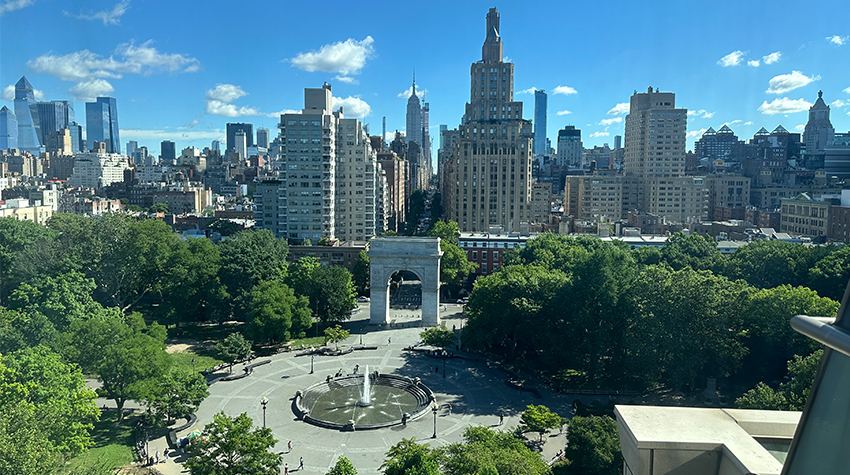
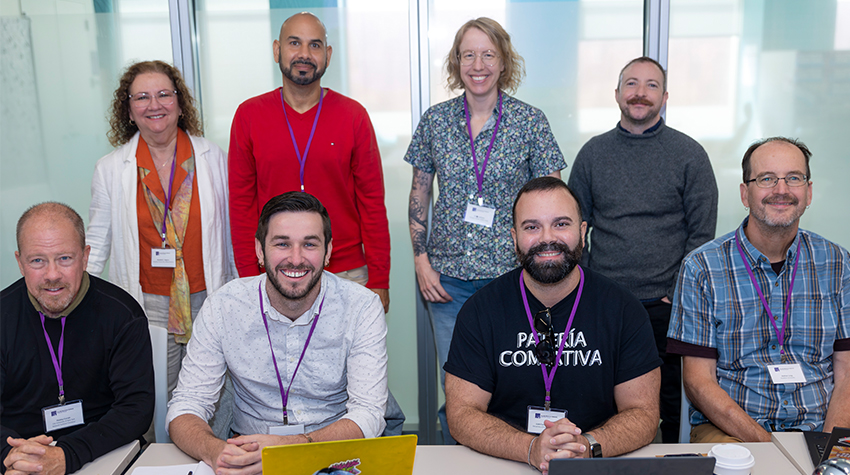
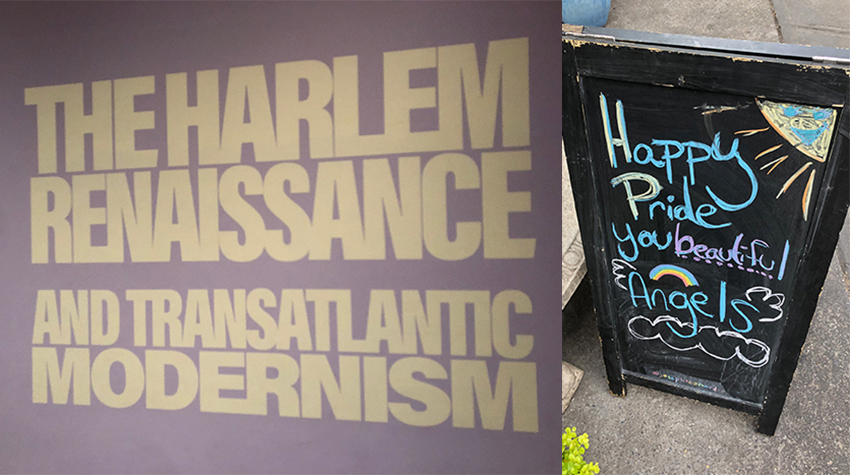
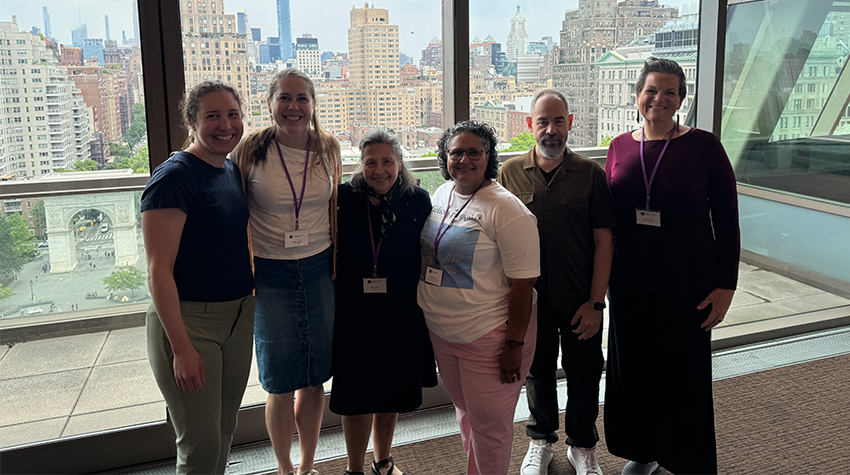
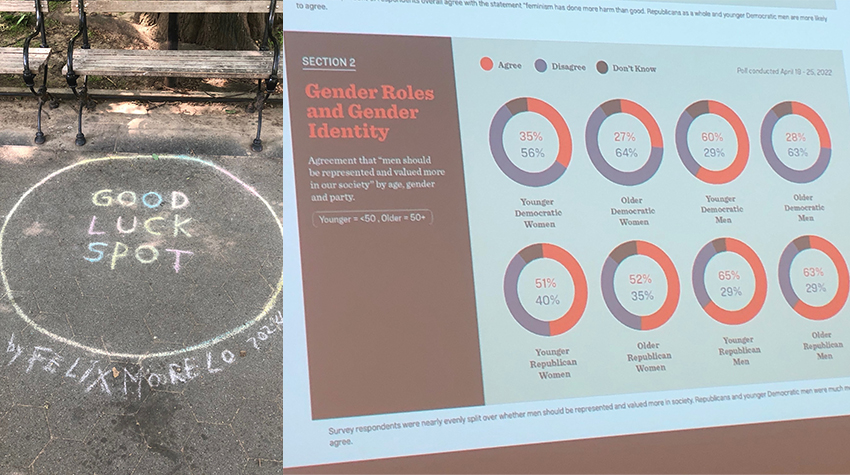
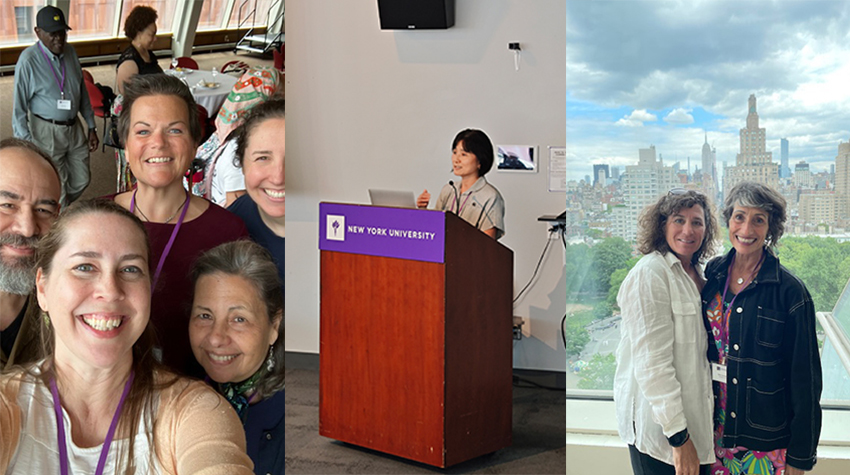
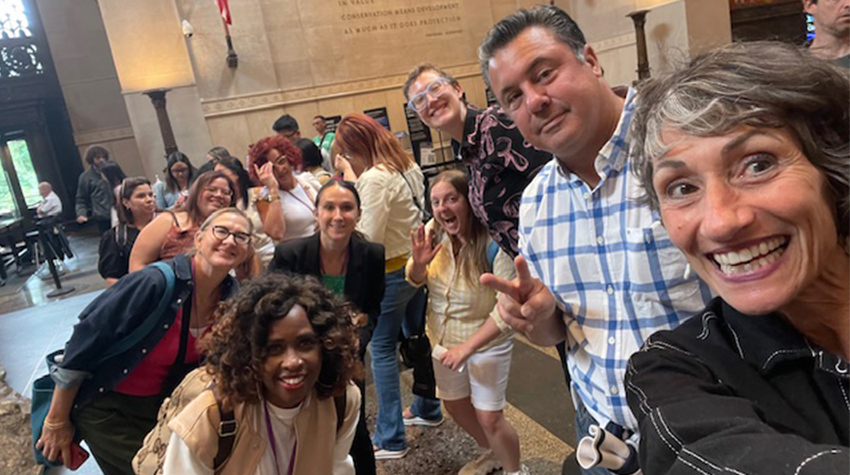
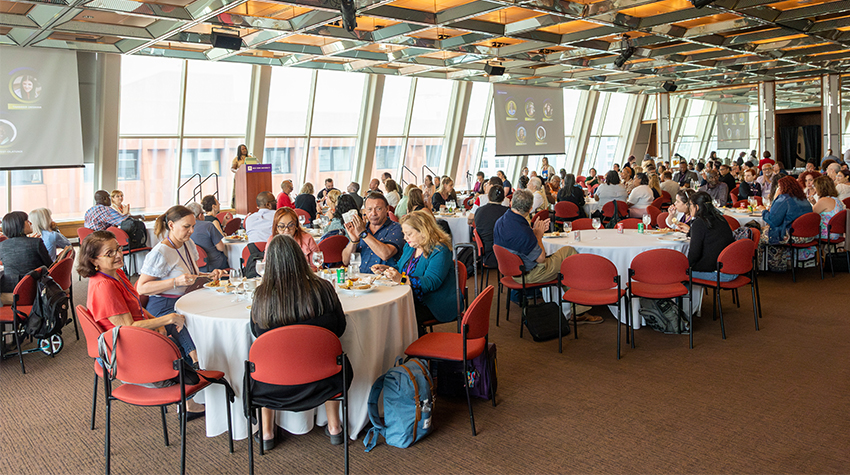
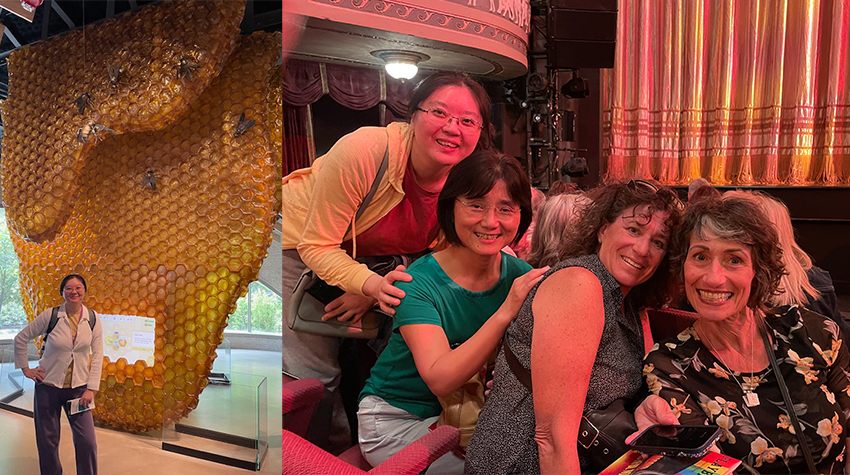
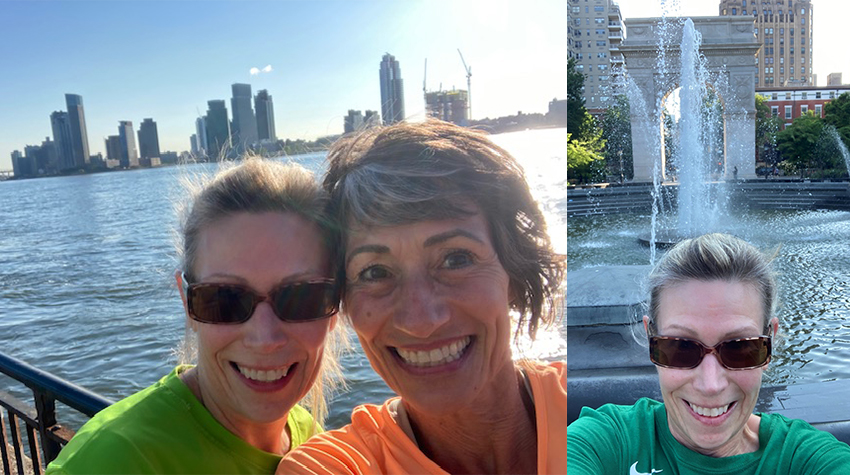
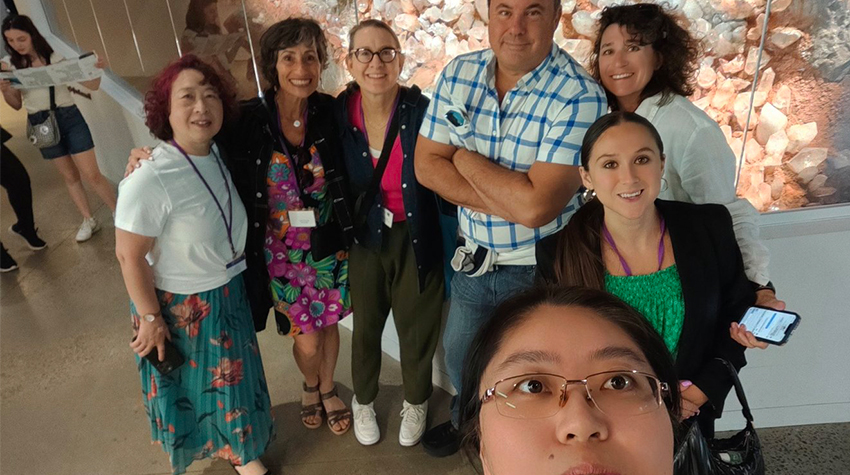
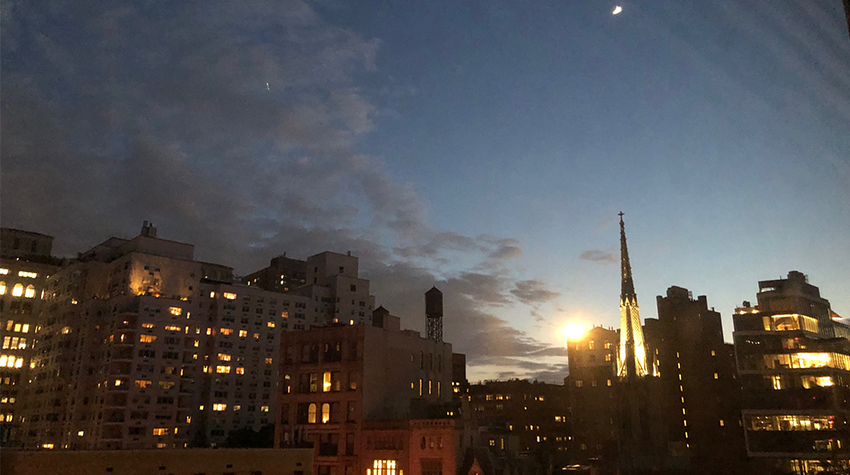
Photos submitted by faculty members.
Creating Spaces for LGBTQ+ Students
Jimmy Hamill, Assistant Professor of Writing & First-Year Studies & Nathan Long, Professor of Creative Writing
The “Moral Panics & LGBTQ+ Politics” session offered many lessons and resources for both Hamill and Long.
For Hamill, the seminar presented an opportunity to connect with and gain a new community of “scholars interested in similar areas of inquiry and re-experience the pleasure of being a student learning with others.” The session offered many lessons and resources that both coincided with the key parts of his research and will be utilized for his upcoming fall course, “Queer Rhetorics.” But he considered the diversity of perspectives to be the greatest take away from it.
“From anthropologists to psychologists to creative writers to librarians to medical practitioners, I was able to see how the rhetoric of moral panic surrounding LGBTQ+ communities impacts each of us, especially those of us identifying as queer or trans,” Hamill said. “We built a true community by the end of the week that will continue to influence me personally and professionally.”
🔑 KEY TAKEAWAY: Moral panics are always irrational, based on little evidence and are created ultimately to change legislation.
According to Long, the session was “invaluable” in learning about and understanding how irrational fear can be crafted to pass laws that harm marginalized communities, citing trans people and immigrants as examples.
Long teaches two classes in the Women’s Gender & Sexuality Studies program – “Transgender Literature” and “Queer Autobiographies” – and believes that the session has already made an indelible impact on him.
“I think it will be invaluable by helping students see the larger political agenda, and the underlying mechanisms of anti-LGBT legislation. But I will also use this knowledge as I read and analyze the news,” Long said. “I have already shared the ideas of this course with a number of friends and relatives because it offers such an important and insightful understanding of the fearmongering that is going on in the U.S. at the moment.”
Inclusivity in Science & Cinema
Elizabeth Lacey, Associate Professor of Marine Science & Michael Rodriguez, Professor of Political Science
For Lacey, the inclusion of science, technology, engineering and math (STEM) was a “true sign” that she should finally attend.
During her session, “Including Inclusion in Science Curriculum,” Lacey was able to discuss pedagogical concerns and strategize on solutions with fellow faculty from other institutions, something that she considered “incredibly beneficial,” especially when discussing the merit of team-based work and learning.
“While (team-based work) has been shown to create a more inclusive and supportive environment for students from a variety of backgrounds, any student (or faculty member) is quick to also acknowledge the challenges of team-based work, such as inadequate communication amongst members, lack of accountability, fair delegation, etc.,” Lacey said.
✍️ 2024’S SUMMER SEMINAR ATTENDEES: Tara Crowell, Mary Lou Galantino, Yulong Gu, Riley Klevence, Connie Tang, Suya Yin, Christine Gayda-Chelder, Trina Gipson-Jones, Manish Madan, Amee Shah, Elizabeth Lacey, Jimmy Hamill, Nathan Long and Michael Rodriguez.
“During the session, I shared the team contracts I created and planned to use in my lab-based courses, which also easily transfer to any team-based assignments I do in lecture. I was able to get immediate feedback from fellow participants about how they could use these contracts in their own courses and institutions, plus improvements to make the contracts even better.”
There are few bigger advocates for the seminars than Rodriguez. Since 2007, he has attended over 20 summer and winter seminars.
The “Feminism in Cinema” session inspired Rodriguez to consider adjusting the curriculum for his course “Race & Politics.”
“(‘Race & Politics’) focuses on the 19th Amendment,” Rodriguez said. “The seminar offered the possibility of replacing that module's content theme with a focus on feminist theory and film — particularly in relation to women of color.”
“I tell colleagues that the FRN has been a game changer for me. Everything has been influenced/informed by my participation in the FRN program — publications, research agenda, pedagogy, course design, and collaborations with professors from other institutions.”
– Story by Loukaia Taylor
Faculty Members Reflect on FRN Experiences
July 20, 2022
Galloway, N.J. - Stockton faculty members engaged in immersive experiences this past June through the Faculty Resource Network (FRN) program offered at New York University. The professional development opportunities and Summer Scholar in Residence enrich their work here at Stockton.
Below, find their reflections:
Michael Rodriguez, Professor of Political Science
“One of the true gems of Stockton University is its longstanding membership in the NYU/FRN Program. The range of professional development opportunities it offers to faculty of all ranks is among the most important sources of professional development at the university, particularly in terms of course development, pedagogy, and scholarship. I have participated in 22 NYU/FRN programs (15 summer seminars, five winter seminars, a book club, and the University Associates Program). These programs have been true ‘game-changers’ throughout my career at Stockton. NYU/FRN seminars generated a new course (POLS 3345 Politics of Immigration), a published book chapter on birthright citizenship, a co-authored book ‘Race and Identity in Hispanic America,’ and a second published book chapter on the pedagogy of critical reading and writing. The seminar I completed this summer on using museums as a pedagogical tool was especially timely because I am revising two courses to include museum exhibitions and artifacts. In addition to the tangible impact of these seminars in terms of new course development, scholarly publications, and pedagogical innovations, the seminars also offer intangible benefits of immense value - e.g., exploring new areas of academic interest and engaging colleagues from throughout the United States in sustained intellectual engagement.”
Reported by Mandee McCullough


